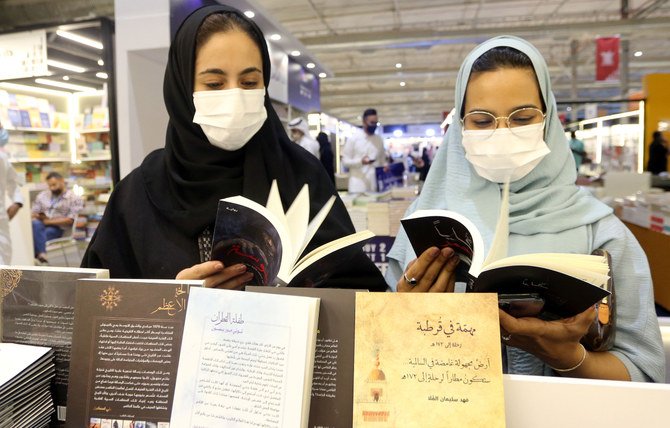
- ARAB NEWS
- 01 Jul 2025

MAKKAH: The march of technology might be gathering pace in all areas of Arab life, but when it comes to reading and enjoying books, old habits die hard, it seems.
Despite warnings in recent years of print’s imminent demise, traditional books are still holding their own against their electronic rivals, as Saudis continue to enjoy the sensation of turning over a new page.
Many publishing houses in the Middle East have acknowledged the power of the printed word, with books maintaining their superiority, especially at book fairs. Buyers still prefer the elegance and feel of a printed masterpiece.
However, publishers acted early to counter the threat posed by electronic books, adopting careful strategies to protect their publications and also fight the growing problem of content piracy.

Rania Al-Moallem, a commissioning editor at Dar Al-Saqi, told Arab News that there is still a relatively low demand for e-books, mainly due to the limited availability of digital devices, which are still considered a luxury item by many people.
“Buying e-books online is not available to everyone, and there is also an emotional bond between readers and print books. Even readers who are able to buy e-books still prefer print, which is understandable,” she said.
An e-book is a protected electronic copy of a book, making piracy and illegal publication difficult. The copy protects the material rights of the writer, primarily, but also the publisher compared with fake electronic copies found online in PDF, Word or other forms.
“Dar Al-Saqi’s publications have been characterized by their format and high-quality content over the years. It is mainly concerned with acting in the reader’s interest and satisfying their tastes as we give great attention to the subject, style and language,” Al-Moallem said.
“We also focus on the final form of the book in terms of presentation, page layout, font and letter size, paper type, cover design and size. All such considerations are subject to the changes and developments experienced with the advancement of the publishing world,” she added.
As well as high-quality print books, the publisher also caters to e-readers through several platforms and has launched an Al-Saqi Digital Library.
“We are aware that the e-book market is yet to be properly established and the print book is still the much preferred format. However, we are also aware of the importance of engaging with e-book readers, as we believe that the relationship between them is complementary, rather than competitive,” Al-Moallem said.
Despite the tech wave, it is evident that devoted readers in the Kingdom are engaged in a constant hunt for the perfect copy, as evidenced by scenes at the Riyadh International Book Fair, where people, young and old, walked out with handfuls of books.
Majid Shebr, manager of Al-Warrak Publishing in London, said that e-books in the Gulf region are still at an embryonic stage.
Publishers faced problems with piracy and uploading of books in PDF format online for free, and have filed complaints with Google in a bid to curb the practice, he said.

Arab states lack platforms that can target free pirated books, which directly affect publishers and pose a significant challenge.
Shebr said that despite their widespread availability, e-books are frequently said to cause eye fatigue. Meanwhile, paper books maintain their dominance in Europe and the Arab world through book fairs.
“I was in a Waterstones book store in London to look at the latest releases and saw that large numbers of people still choose paper books,” he said.
Shebr said the competition between the print and electronic formats is driven by the reader’s style and language convenience.
Egyptian writer and novelist Rasha Samir said that as an avid reader, she doubted that e-books could ever match the pleasure of reading print.
“I cannot get rid of the habit of reading paper books and I cannot read electronically at all. The feel of a book, the smell, and the written dedication of literary figures are the secret of my attachment to this type of reading,” she said.
“Paper books will always be my treasure that I keep on the shelves of my large library,” she said.
Some publishers believe that publishing electronically allows them to sell their publications faster, and that online advertisements are easier and do not cost as much compared with paper publications.
Others believe that electronic publishing will eliminate paper books, but these are the origins of the industry, and this should be combated.
Samir added: “There is no fault in finding a literary work electronically, as it gives easy access to several groups such as expatriates and Arabs who live far from Arab libraries. It has now become a means that supports publications and advertises the work of a writer; it has become a good way to shorten the distances that paper books cannot minimize sometimes.”
She said that the response to print or electronic books often depends on the reader’s age and older generations are reluctant to abandon paper, while younger people might see it as nonpractical at a time dominated by modern technology.
With the new generation, whose lives are dominated by technology and the internet, publications need to keep pace, Samir said.
“This is a generation that learns through social media and no longer uses paper books as a source of information. Google is their most trusted source, which is a problem, so we need to meet them halfway, encourage them to read and learn in their own way while we help guide them. We should also push them to understand the value of books, evaluate their content and distinguish valuable books from cheap ones.”
Even if reading on paper transitioned to reading on Kindle or any other device, as educated people, we should continue to advocate for paper books and the preservation of their place.
Adel Houshan, a Saudi poet and novelist, said that even after the demise of some print empires in the Arab world and around the globe, digital projects, including e-books and audiobooks, still suffer due to two reasons.
“The first is related to advertising, as they rely on institutions and small projects that cannot find a way to break the power of paper books and their rich history. The second reason is Arab book festivals, which are growing in popularity with the help of social media,” he said.
“Years ago, we said that paper will not last long, but old habits die hard.”